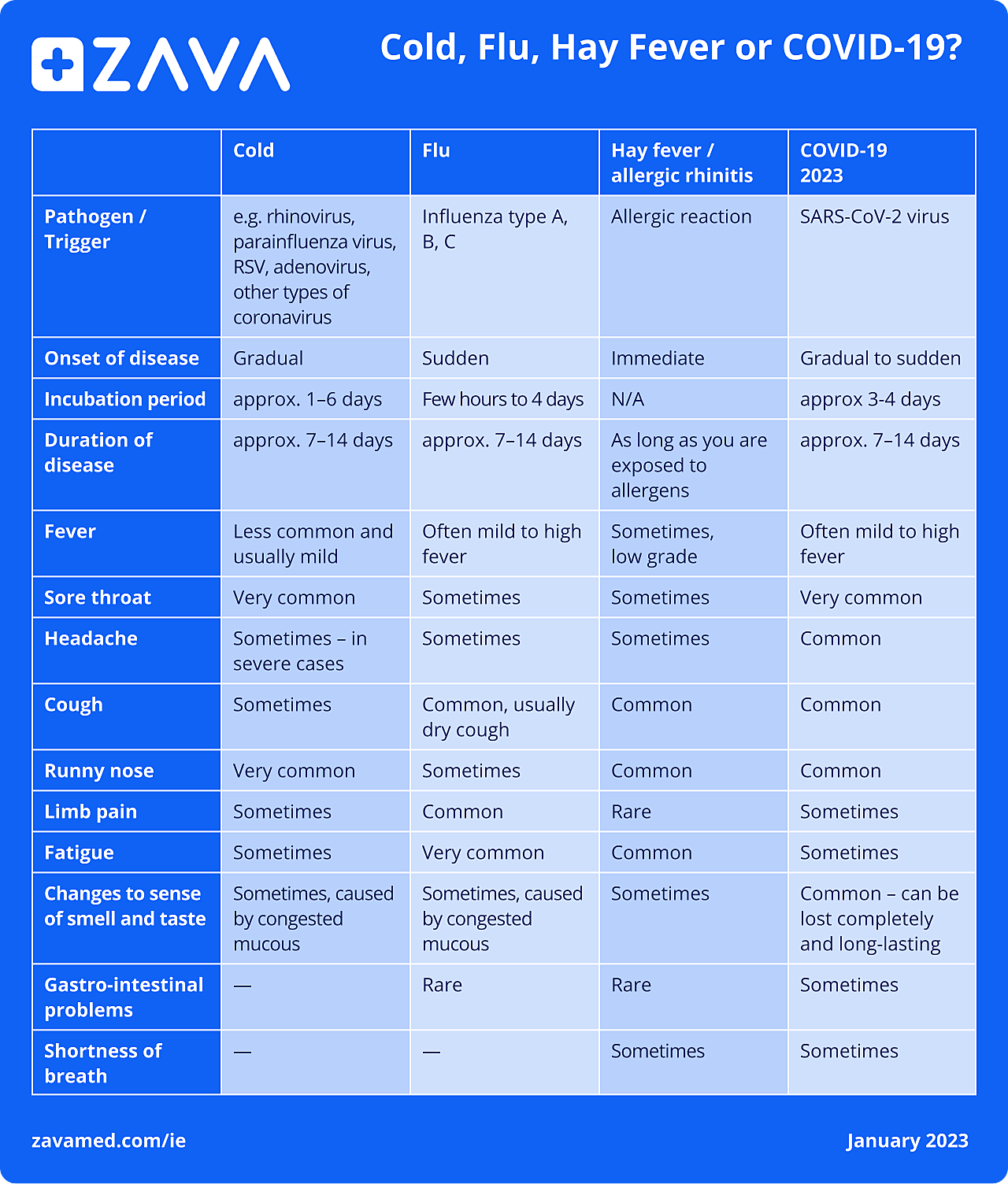Cold, Flu, Hay Fever, or COVID-19?

Medically reviewed by
Dr Babak AshrafiLast reviewed: 01 Feb 2023
The symptoms associated with COVID-19 have changed over time, and since they are so similar to those of a cold, the flu, or hay fever, it can be difficult to know which condition you have. The best way to be sure is to familiarise yourself with the symptoms of each condition and take a COVID-19 test, this way you will know what to do to keep yourself and the people around you safe.
How can I tell the difference between a cold, flu, hay fever, and coronavirus?
While these illnesses have similar symptoms, they usually do not share all of them. And, it's unlikely you will get these illnesses at the same time, or experience all of their symptoms. Below you can find a table detailing these symptoms and the differences between them.

As you can see, both COVID-19 and flu can have a range of varying symptoms which can be severe and, in some cases, 'asymptomatic' (showing no symptoms). The most common symptoms that the flu and the most recent variant of COVID-19 can share include:
- fever
- cough
- shortness of breath or difficulty breathing
- changes to sense of smell and taste
- gastro-intestinal problems
- fatigue (tiredness)
- sore throat
- runny or stuffy nose
- muscle pain or body aches
- headache
The primary way to spot the difference between the two is that COVID-19 may cause some people to completely lose their sense of taste and smell. Colds and hay fever differ to both as they tend to result in a less severe illness.
COVID-19 - The most common symptoms of COVID-19 are:
- a sore throat
- a runny or blocked nose
- sneezing
- a cough with or without phlegm
- headache
- a hoarse voice
- muscles aches and pains
- changes to sense of smell and taste
You may also experience symptoms including fatigue, gastro-intestinal problems, and shortness of breath.
Flu - The most common symptoms of flu are:
- fever
- fatigue
- a dry cough
- aches and pains
- headaches
Patients will sometimes also experience a runny or blocked nose, or a sore throat. There is usually no sneezing with the flu, but shortness of breath can develop. The symptoms of flu usually set in quite quickly.
Cold - The most common symptoms of a cold are:
- sneezing
- aches and pains
- a runny nose
- a sore throat
You may also experience fatigue, but it is less common to experience a fever or headaches. The symptoms of a cold tend to set in quite gradually.
Hay fever - The most common symptoms of hay fever are:
- itchy or watery eyes
- a runny or blocked nose
- sneezing and coughing
- fatigue
Other, less common, symptoms which you may experience include:
- a sore throat
- headaches
- shortness of breath
- a low grade fever
- changes to sense of smell and taste
These symptoms will often occur immediately after you have been in contact with any allergens, such as pollen.
How long does it take for symptoms to appear after infection?
With both COVID-19 and the flu, it can take 1 or more days before an infected person starts experiencing symptoms. With a cold, you may not experience any symptoms until after 3 days of becoming infected. Hay fever is caused by exposure to allergens, and symptoms begin immediately after this happens.
COVID-19 - Symptoms typically appear within a few days after becoming infected, but can occur up to 14 days later.
Flu - Symptoms can take 1-4 days to appear following an infection.
Cold - It can take up to 3 days to notice the symptoms of a cold following an infection.
Hay fever - Symptoms will be present immediately after contact with allergens.
How long am I infectious for?
For both COVID-19 and flu, it's possible to spread the virus for at least 1 day before experiencing any symptoms. With a cold, you are infectious a few days before showing any symptoms, and you can remain infectious until you no longer have symptoms. Hay fever is not infectious.
COVID-19 - It’s possible to be infectious before you start showing symptoms, but the period you remain infectious for is typically up to 10 days. The NHS advises avoiding contact with people at higher risk from COVID-19 for 10 days after a positive result.
Flu - Most people with flu are contagious for approximately one day before they start showing symptoms and will be most contagious during the first 3-4 days of the illness, but they can still be contagious for up to 7 days.
Cold - If you have a cold, you tend to be infectious until all of your symptoms have gone (which can take 2-3 weeks). Symptoms are usually worse during the first 2 to 3 days, and this is when you're most likely to spread the virus.
Hay fever - Since hay fever is not a virus, and is triggered by an allergic reaction, you will not be contagious.
How do these illnesses spread?
With the exception of hay fever, all of these conditions are viruses which tend to spread through the air and close personal contact. They can also be spread through droplets from coughing or sneezing by an infected person or from a contaminated surface. While these illnesses do spread in similar ways, there are certain groups who are at higher risk from COVID-19 (such as people over the age of 60 or with other medical conditions - such as Down’s syndrome, leukaemia, or HIV/AIDS).
Hay fever is triggered by coming into contact with allergens such as pollen. It can not be spread from person to person.
Can I get a vaccine for the cold, flu, hay fever, or COVID-19?
COVID-19 - There are multiple types of COVID-19 vaccines approved and available for use in the UK. Everyone aged 5 (on or before 31 August 2022) and over can get a 1st and 2nd dose of the vaccine. People aged 16 and over, and some children aged 12 to 15, can also get a booster dose.
Flu - There are multiple flu vaccines produced annually, and it's recommended to get one if you are in a vulnerable group. Vulnerable groups include those who are:
- aged 65 or over
- pregnant
- ill with a long term condition such as diabetes, or heart or chest problems
- living in a residential or nursing home
- living with someone who has lowered immunity
- the main carer of an older or disabled person
- a frontline health or social worker
Cold - There is no cure or vaccine for the common cold. This is because there are over 200 varieties of viruses that can cause colds and it wouldn't be feasible to vaccinate against all of these. Colds also tend to be less dangerous than the flu or COVID-19 making developing a vaccine less of a priority.
Hay fever - there is no permanent cure or vaccine for hay fever, but there are treatments you can take to help ease the symptoms. If your hay fever is severe, specialist clinics can offer allergen immunotherapy (desensitisation).

Babak studied medicine at King’s College London and graduated in 2003, having also gained a bachelor’s degree in Physiology during his time there. He completed his general practice (GP) training in East London, where he worked for a number of years as a partner at a large inner-city GP practice. He completed the Royal College of GPs membership exam in 2007.
Meet our doctorsLast reviewed: 01 Feb 2023
-
Common cold (2021) NHS [accessed January 2023]
-
Coronavirus (COVID-19) vaccine (2022) NHS [accessed January 2023]
-
Flu (2022) NHS [accessed January 2023]
-
Hay fever (2021) NHS [accessed January 2023]
-
Symptoms of coronavirus (COVID-19) (2022) NHS [accessed January 2023]






